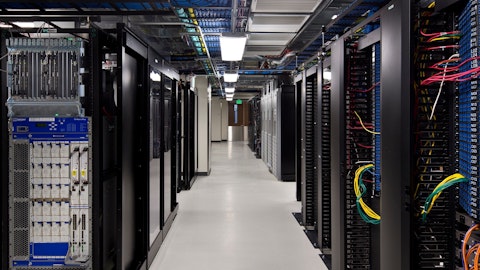In this piece, we will take a look at ten cheap reliable stocks to buy now. For more stocks to buy, head on over to 5 Cheap Reliable Stocks to Buy Now.
These days investing in the stock market is not for the faint of heart. The bloodbath of 2022, not only in the stock market but also in the cryptocurrency sector, shook the confidence that risk tolerant investors, including the retail sector, had in themselves in the market. The market fell due to a multitude of factors, not the least of which were soaring inflation, the Russian invasion of Ukraine, and the interest rate hikes by the Federal Reserve.
However, 2023 provided investors with some respite. For instance, shares of Tesla, Inc. (NASDAQ:TSLA), which dropped from $342 at the start of 2022 to a stunning $123 as the year closed for a stunning 64% drop, are now up a whopping 79% year to date and have climbed back up to $193 year to date to claw back some of their losses. Another worst performer stock last year was Meta Platforms, Inc. (NASDAQ:META) whose shares started at $336 in 2022 and closed at $120 as the year ended for a similar trading range as Tesla and for an equal 64% drop. However, year to date, Meta’s shares are by a similar 64% and are trading around $205.
A central theme for the stock market is whether there will be a recession in the U.S. This is due to the fact that the Federal Reserve’s interest rate hikes are precisely intended to slow down the American economy in an attempt to bring down prices before they become a permanent part of both the economy and the people’s perception. Multiple investment banks and analysts have provided their views on inflation. For instance, JPMorgan Chase & Co. (NYSE:JPM) has one of the latest takes on the matter as in a fresh post in March 2023, the bank had some tips for people who have invested in real estate. The bank published a piece with perspectives from its own analysts and from Moody’s to share the likeliness of a recession in the U.S. and how those that had invested in the real estate sector. On the topic of a recession, the bank’s research suggests that while a recession can take place later this year, it might be over in three months and last for a maximum of nine months. At the same time, since the recession will be relatively mild, firms that will lay off employees will also position themselves for recovery, and as far as the real estate sector goes, half of the firms expect to maintain their current headcount.
Another fresh take on the recession comes from the chief executive officer of Bank of America Corporation (NYSE:BAC) Mr. Brian Moynihan. The executive shared his thoughts at the Financial Review’s Business Summit in Sydney at the start of March. At the event, Mr. Moynihan outlined that his bank expects negative GDP growth in the U.S. that will last three quarters that will primarily be dominated by companies slowing down their operations, with the consumer still having plenty of purchasing power. Bank of America’s prediction sees the U.S. economy stop growing in the third quarter of this year and end at the start of next year’s second quarter. He added that most people won’t even notice a recession (kind of the same thing your dentist says before a procedure) since the economic output will drop at most by a single percentage point and could be as low as 50 basis points (0.50%).
Looking at the broader consensus for a recession, a survey from the National Association for Business Economics (NABE) which was released in February 2023 outlined that 58% of the 49 economists polled believed that a recession will take place this year. Crucially, this percentage was similar to the economists that held the same view in a December 2022 survey. Yet still, the number of economists who believe that the economy will enter into a recession by the end of March 2023 was cut in half, with a quarter still believing this to be the case. This shift in the timeline of the recession comes due to the surprising resilience of the U.S. economy with data for the labor market and inflation still hinting at resilience despite the Fed’s stunning interest rate hikes. In numeric terms, one third of those polled believe that a recession will start during the April quarter and a fewer one fifth expect it to start in the third quarter.
Since it’s all about recession, billionaire Ken Fisher of Fisher Investments compared the current turmoil with that during 1966 and 1967 as he’s had the pleasure of having lived in both eras. According to him:
But if you weren’t there, you kind of don’t get it. I mean first, the world was still the world. U.S. markets correlated with non U.S markets. All that’s been a constant. The U.S. was the world’s biggest economy, more so than now relative to the world. But at the time, there was another regional war. And the U.S. spent money on that, other countries not so much, a few. That’s very parallel to what’s going with Ukraine. Just different players. We were a bit after presidential election. About same amount of time. President then, Lyndon Johnson, was thought to be a moderating force when he was elected but by 1966, there was the beginning of protests and hostility tied to the Vietnamese was and the aftermath of the spending associated with the great society, which in some ways parallels the spending associated with the covid phenomenon.
Because if you look at a lot of that spending, like a lot of the infrastructure spending, it wasn’t spent on infrastructure, it was spent on social stuff. Then too, you had a sudden rise in short term interest rates in the United States and around the world tied to what? Oh yeah! Fighting off inflation! Now mind you it wasn’t as big a in 2022, but up to that point, relatively to what the Fed had done, it was big. Then, too, you had people saying in media if you go back and study that we can’t have a market bottom because we haven’t had capitulation. You remember people saying that in 2022? But the market which in 1966 had peaked in the first week in January, and bottomed in the second week of October, parallels almost perfectly what happened in 2022, where we got a bottom in October without capitulation.
Mr. Fisher goes on to add that the categories that did well back then are also similar, and there were similar fears of a ‘recession.’ However, despite the fears of a recession in 1967, the market ended up doing well.
With these details in mind, let’s take a look at some cheap and reliable stocks, with the top picks being The TJX Companies, Inc. (NYSE:TJX), CVS Health Corporation (NYSE:CVS), and Amazon.com, Inc. (NASDAQ:AMZN).

Pixabay/Public Domain
Our Methodology
To pick out the stocks for this list, we chose to focus on retailers that primarily rely on selling goods and products as there primary business models. Additionally, firms that operate mostly in the U.S. or have a strong presence here are mentioned, which made us eliminate Alibaba Holding Group Limited (NYSE:BABA), which also has other business divisions too. The companies are selected based on the number of hedge fund investors during the fourth quarter of last year, with the top ten listed below except Alibaba.
10 Cheap Reliable Stocks to Buy Now
10. Dollar General Corporation (NYSE:DG)
Number of Hedge Fund Shareholders in Q4 2022: 59
Dollar General Corporation (NYSE:DG) is an American firm headquartered in Goodlettsville, Tennessee. The firm operates a chain of discount stores that sell a wide variety of products such as groceries apparel, and cosmetics.
By the end of last year’s fourth quarter, 59 of the 943 hedge funds polled by Insider Monkey had bought Dollar General Corporation (NYSE:DG)’s shares. The firm’s largest investor is Nicolai Tangen’s Ako Capital which owns 934,928 shares that are worth $230 million.
Dollar General Corporation (NYSE:DG) joins CVS Health Corporation (NYSE:CVS), The TJX Companies, Inc. (NYSE:TJX), and Amazon.com, Inc. (NASDAQ:AMZN) in our list of cheap and reliable stocks.
9. The Home Depot, Inc. (NYSE:HD)
Number of Hedge Fund Shareholders in Q4 2022: 62
The Home Depot, Inc. (NYSE:HD) is one of the largest retailers in the U.S. It has more than two thousand stores all over the U.S., and as its name suggests, the firm primarily sells home building and maintenance products. The firm is based in Atlanta, Georgia.
As of Q4 2022, 62 of the 943 hedge funds surveyed by Insider Monkey had invested in the firm. Out of these, The Home Depot, Inc. (NYSE:HD)’s largest investor is Ken Fisher’s Fisher Asset Management which owns 8.2 million shares that are worth $2.6 billion.
8. JD.com, Inc. (NASDAQ:JD)
Number of Hedge Fund Shareholders in Q4 2022: 64
JD.com, Inc. (NASDAQ:JD) is a Chinese company that is a pureplay retailer. It sells groceries, technology products, and others, alongside also acting as a medium for merchants. The firm is based in Beijing, Canada.
Insider Monkey’s 943 hedge fund poll for last year’s final quarter found out that 64 had bought JD.com, Inc. (NASDAQ:JD)’s shares. Its largest investor is Chase Coleman and Feroze Dewan’s Tiger Global Management LLC which owns 21 million shares that are worth $1.2 billion.
7. Lululemon Athletica Inc. (NASDAQ:LULU)
Number of Hedge Fund Shareholders in Q4 2022: 65
Lululemon Athletica Inc. (NASDAQ:LULU) is a Canadian apparel distributor with a global presence in countries including the U.K., Ireland, Spain, and France.
By the end of 2022’s December quarter, 65 of the 943 hedge funds part of Insider Monkey’s database had bought Lululemon Athletica Inc. (NASDAQ:LULU)’s shares. Paul Marshall and Ian Wace’s Marshall Wace LLP is the company’s largest investor in our database through a $322 million stake.
6. Costco Wholesale Corporation (NASDAQ:COST)
Number of Hedge Fund Shareholders in Q4 2022: 66
Costco Wholesale Corporation (NASDAQ:COST) is an American company that sells a diverse lineup of products including groceries, healthcare products, and electronics.
66 of the 943 hedge funds had invested in Costco Wholesale Corporation (NASDAQ:COST) during Q4 2022. is the company’s largest investor with a $1.1 billion stake that comes via 2.5 million shares. 2149
The TJX Companies, Inc. (NYSE:TJX), Costco Wholesale Corporation (NASDAQ:COST), CVS Health Corporation (NYSE:CVS), and Amazon.com, Inc. (NASDAQ:AMZN) are some cheap and reliable stocks.
Click to continue reading and see 5 Cheap Reliable Stocks to Buy Now.
Suggested Articles:
- 15 Biggest Private Oil Companies in the World
- Top 10 Growth Stocks in Biotech
- 15 Most Profitable Growth Stocks Now
Disclosure: None. 10 Cheap Reliable Stocks to Buy Now is originally published on Insider Monkey.





